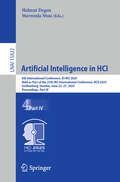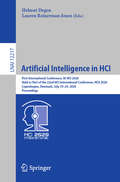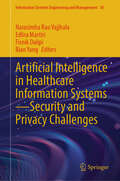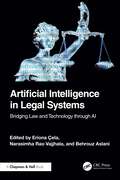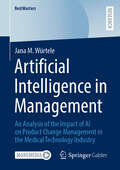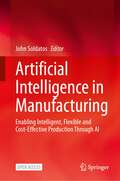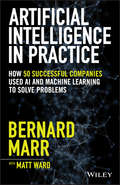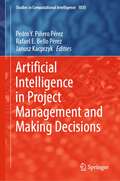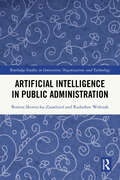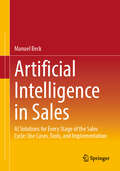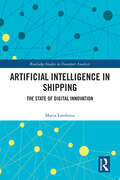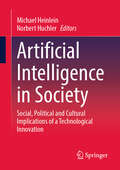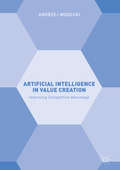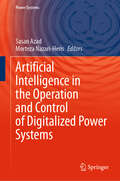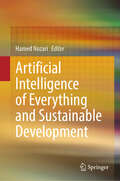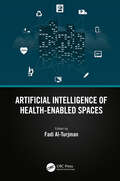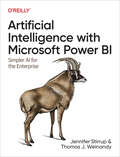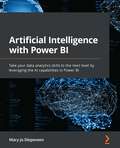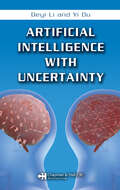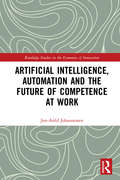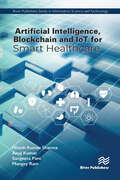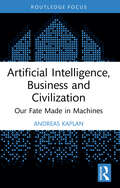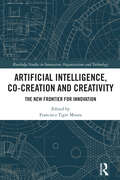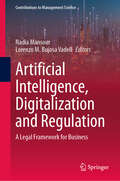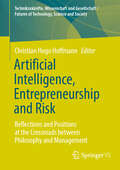- Table View
- List View
Artificial Intelligence in HCI: 6th International Conference, AI-HCI 2025, Held as Part of the 27th HCI International Conference, HCII 2025, Gothenburg, Sweden, June 22–27, 2025, Proceedings, Part IV (Lecture Notes in Computer Science #15822)
by Helmut Degen Stavroula NtoaThe four-volume set LNAI 15819–15822 constitutes the thoroughly refereed proceedings of the 6th International Conference on Artificial Intelligence in HCI, AI-HCI 2025, held as part of the 27th International Conference, HCI International 2025, which took place in Gothenburg, Sweden, June 22-17, 2025. The total of 1430 papers and 355 posters included in the HCII 2025 proceedings was carefully reviewed and selected from 7972 submissions. The papers have been organized in topical sections as follows: Part I: Trust and Explainability in Human-AI Interaction; User Perceptions, Acceptance, and Engagement with AI; UX and Socio-Technical Considerations in AI Part II: Bias Mitigation and Ethics in AI Systems; Human-AI Collaboration and Teaming; Chatbots and AI-Driven Conversational Agents; AI in Language Processing and Communication. Part III: Generative AI in HCI; Human-LLM Interactions and UX Considerations; Everyday AI: Enhancing Culture, Well-Being, and Urban Living. Part IV: AI-Driven Creativity: Applications and Challenges; AI in Industry, Automation, and Robotics; Human-Centered AI and Machine Learning Technologies.
Artificial Intelligence in HCI: First International Conference, AI-HCI 2020, Held as Part of the 22nd HCI International Conference, HCII 2020, Copenhagen, Denmark, July 19–24, 2020, Proceedings (Lecture Notes in Computer Science #12217)
by Lauren Reinerman-Jones Helmut DegenThis book constitutes the refereed proceedings of the First International Conference on Artificial Intelligence in HCI, AI-HCI 2020, held as part of the 22nd International Conference on Human-Computer Interaction, HCII 2020, in July 2020. The conference was planned to be held in Copenhagen, Denmark, but had to change to a virtual conference mode due to the COVID-19 pandemic. The conference presents results from academic and industrial research, as well as industrial experiences, on the use of Artificial Intelligence technologies to enhance Human-Computer Interaction. From a total of 6326 submissions, a total of 1439 papers and 238 posters has been accepted for publication in the HCII 2020 proceedings. The 30 papers presented in this volume were organized in topical sections as follows: Human-Centered AI; and AI Applications in HCI.pical sections as follows: Human-Centered AI; and AI Applications in HCI.
Artificial Intelligence in Healthcare Information Systems—Security and Privacy Challenges (Information Systems Engineering and Management #34)
by Narasimha Rao Vajjhala Edlira Martiri Fisnik Dalipi Bian Yang“Artificial Intelligence (AI) in Healthcare Information Systems: Security and Privacy Challenges” offers a deep dive into the integration of AI in healthcare, with a primary focus on addressing the significant security and privacy concerns that arise in this domain. The chapters in this book highlight the transformative potential of AI in diagnosing and predicting diseases, as well as its impact on fields like fetal medicine, but places special emphasis on the need for robust encryption, data protection techniques, and ethical considerations to safeguard sensitive healthcare data. The book also explores global case studies, from India to Kazakhstan, outlining the challenges and prospects of AI adoption in diverse healthcare settings. Readers will gain insights into AI's role in improving patient outcomes while navigating the complexities of data privacy and security. The book is a valuable resource for healthcare professionals, technologists, and policymakers who are focused on implementing AI-driven solutions securely and ethically in healthcare systems.
Artificial Intelligence in Legal Systems: Bridging Law and Technology through AI
by Eriona Çela Narasimha Rao Vajjhal Behrouz A. AslaniThis book presents a comprehensive analysis of the transformative impact of artificial intelligence (AI) on legal frameworks within the European Union and beyond. It illustrates both the promising benefits of AI in improving access to justice and the significant challenges that necessitate thoughtful regulatory frameworks and interdisciplinary cooperation.This book highlights the expansive applications of AI, ranging from case management to predictive analytics, while also scrutinizing ethical challenges and legal implications. It addresses the pressing issue of data protection in the context of Generative Pre-trained Transformer (GPT) technology, emphasizing the EU’s commitment to individual privacy rights. This book also evaluates AI’s role in public governance, using Albania as a case study, and examines the potential of blockchain technology in enhancing legal processes. The ethical nuances surrounding AI’s integration into legal systems are critically examined, particularly regarding algorithmic bias and human oversight. This book advocates for a collaborative approach involving legal experts and data scientists to navigate these complexities effectively.This book is a key resource for postgraduate students, researchers, and legal professionals seeking to better understand the benefits and risks of incorporating AI into legal practice.
Artificial Intelligence in Management: An Analysis of the Impact of AI on Product Change Management in the Medical Technology Industry (BestMasters)
by Jana M. WürteleIn an era of constant global change, companies are challenged to adapt quickly to evolving consumer demands and technological innovations. However, the complexity of product changes in the medical technology industry is particularly high. Leveraging expertise of interview partners from Germany, Switzerland, Liechtenstein, and India, this book examines the perception of digital transformation within the medical technology industry and the increasing prominence of artificial intelligence as a transformative force. Thus, it provides a critical analysis of the potential opportunities for optimization and risks of integrating this technology into product change management in this sector, offering a comprehensive perspective for management practice.
Artificial Intelligence in Manufacturing: Enabling Intelligent, Flexible and Cost-Effective Production Through AI
by John SoldatosThis open access book presents a rich set of innovative solutions for artificial intelligence (AI) in manufacturing. The various chapters of the book provide a broad coverage of AI systems for state of the art flexible production lines including both cyber-physical production systems (Industry 4.0) and emerging trustworthy and human-centered manufacturing systems (Industry 5.0). From a technology perspective, the book addresses a wide range of AI paradigms such as deep learning, reinforcement learning, active learning, agent-based systems, explainable AI, industrial robots, and AI-based digital twins. Emphasis is put on system architectures and technologies that foster human-AI collaboration based on trusted interactions between workers and AI systems. From a manufacturing applications perspective, the book illustrates the deployment of these AI paradigms in a variety of use cases spanning production planning, quality control, anomaly detection, metrology, workers’ training, supply chain management, as well as various production optimization scenarios. This is an open access book.
Artificial Intelligence in Practice: How 50 Successful Companies Used AI and Machine Learning to Solve Problems
by Bernard MarrCyber-solutions to real-world business problems Artificial Intelligence in Practice is a fascinating look into how companies use AI and machine learning to solve problems. Presenting 50 case studies of actual situations, this book demonstrates practical applications to issues faced by businesses around the globe. The rapidly evolving field of artificial intelligence has expanded beyond research labs and computer science departments and made its way into the mainstream business environment. Artificial intelligence and machine learning are cited as the most important modern business trends to drive success. It is used in areas ranging from banking and finance to social media and marketing. This technology continues to provide innovative solutions to businesses of all sizes, sectors and industries. This engaging and topical book explores a wide range of cases illustrating how businesses use AI to boost performance, drive efficiency, analyse market preferences and many others. Best-selling author and renowned AI expert Bernard Marr reveals how machine learning technology is transforming the way companies conduct business. This detailed examination provides an overview of each company, describes the specific problem and explains how AI facilitates resolution. Each case study provides a comprehensive overview, including some technical details as well as key learning summaries: Understand how specific business problems are addressed by innovative machine learning methods Explore how current artificial intelligence applications improve performance and increase efficiency in various situations Expand your knowledge of recent AI advancements in technology Gain insight on the future of AI and its increasing role in business and industry Artificial Intelligence in Practice: How 50 Successful Companies Used Artificial Intelligence to Solve Problems is an insightful and informative exploration of the transformative power of technology in 21st century commerce.
Artificial Intelligence in Project Management and Making Decisions (Studies in Computational Intelligence #1035)
by Janusz Kacprzyk Pedro Y. Piñero Pérez Rafael E. Bello PérezThis book presents new developments and advances in the theory, applications, and design methods of computational intelligence, integrated in various areas of project management and BIM environments. The chapters of the book span different soft computing techniques, such as: linguistic data summarization, fuzzy systems, evolutionary algorithms, estimation distribution algorithms, computing with words, augmented reality, and hybrid intelligence systems. In addition, different applications of the neutrosophic theory are presented for the treatment of uncertainty and indeterminacy in decision-making processes. Several chapters of the book constitute systematic reviews, useful for future investigations in the following topics: linguistic summarization of data, augmented reality, and the development of BIM technologies. It is a particularly interesting book for engineers, researchers, specialists, teachers, and students related to project management and the development of BIM technologies.
Artificial Intelligence in Public Administration (Routledge Studies in Innovation, Organizations and Technology)
by Radosław Wolniak Bożena Skotnicka-ZasadzieńThis book presents a conceptualization of the process of using artificial intelligence (AI) in public administration, along with its operationalization in terms of technology, competence, and the use of AI by employees of municipal offices. The authors offer a holistic examination, drawing on a multidisciplinary approach that combines theoretical insights with empirical analyses, to develop a theoretical model for improving the use of AI in public administration.The book provides a nuanced understanding of the complex interactions between AI technologies, governance structures, and public service delivery models, as well as diverse case studies across administrative domains to offer cross-national insights and shedding light on the contextual factors shaping AI adoption and implementation strategies. Through dedicated chapters on ethics and safety, the book also critically examines the challenges and opportunities policymakers must navigate when implementing AI.Combining theory with practice, this book will be of interest to scholars and post-graduate students in the fields of public administration, policy studies, governance as well as artificial intelligence and technology management.
Artificial Intelligence in Sales: AI Solutions for Every Stage of the Sales Cycle: Use Cases, Tools, and Implementation
by Manuel BeckThis book provides a practical introduction to the application and implementation of Artificial Intelligence (AI) in sales organizations. The author demonstrates how companies can generate a significant competitive advantage through the targeted use of AI in sales. Step by step, he explains the innovative possibilities offered by various types and methods of AI throughout the entire sales cycle and how they can be applied at key customer touchpoints—from lead generation and qualification to outreach and conversation support, as well as presentation, proposal creation, negotiation, customer care, and onboarding. Both classical and generative AI tools are examined, numerous use cases are presented, and specific prompting suggestions for AI-supported work with ChatGPT and other generative language models are provided. A comprehensive selection of real providers of the presented AI solutions for each phase of the sales cycle offers direct points of reference for practical implementation in your company. A compact and immediately applicable guide for modern, forward-looking sales.
Artificial Intelligence in Shipping: The State of Digital Innovation (Routledge Studies in Transport Analysis)
by Maria LambrouThe book addresses strategic and innovation management matters that emerge with AI technology deployment in shipping. It illustrates the making of an AI-powered shipping operation as a process; advances in AI technology as well as trustworthy design and development principles and practices can frame, inspire, and guide the contextualized AI-instigated shipping digitalization.The volume elaborates on foreseen value aggregation models stemming from the AI and human symbiosis possibilities, and the consequences these developments imply for shipping business organizations and markets. Preemptive value creation models are exemplified, including endeavours for deep shipping knowledge creation, shipping business process augmentation for both low-discretion and high-criticality tasks, and autonomous vessel and maritime infrastructures establishment, as well as new AI-supply side oriented business models. The author posits that AI-driven renewal strategies do not imply a disinvestment in ‘legacy’ functions (aka ship ownership and management) paired with aggressive investment in AI development and platformization; AI management directs a new mix of conceivable physical and digital assets, resources, and capabilities for the chosen nuance of a firm’s business model innovation. The central argument of the book elaborates how shipping companies in the loop can be nothing but the negotiated outcome of a new AI-powered institutional entrepreneurial regime; embedded, distributed agency mechanisms enact the wealth-creating, progressive, and responsible digitalization of shipping.This volume will be of value to students and researchers interested in shipping markets, digital technology, and innovation management.
Artificial Intelligence in Society: Social, Political and Cultural Implications of a Technological Innovation
by Michael Heinlein Norbert HuchlerArtificial Intelligence (AI) represents a key technology for social change in the 21st century. Numerous technological applications are now in use that are based on machine learning and the associated possibilities for data collection, use and exploitation. By making large amounts of data manageable and hidden patterns and connections visible, AI makes many things faster, easier and more efficient - be it in everyday life, at work or in organizations. However, the question remains open as to what profound and sometimes latent consequences for humans as social beings and social coexistence are associated with the use and development of AI. How is the relationship between people and technology changing through AI and how should this change be assessed? What opportunities and risks do the use and development of AI open up for people and society? What are the limits of change and what design options are available? And last but not least: What and who determines the development paths that AI takes - with what consequences and for whom? Some of the articles in this volume have been automatically translated into English by Springer (machine translation by the service DeepL.com). The contributions were then thoroughly revised, corrected and supplemented by the authors. The authors are therefore responsible not only for the content, but also for the linguistic form of the articles. Nevertheless, the text of the book may differ stylistically from a conventional translation.
Artificial Intelligence in Value Creation: Improving Competitive Advantage
by Andrzej WodeckiThis book analyses various models of value creation in projects and businesses by applying different forms of Artificial Intelligence in their products and services. First presenting the main concepts and ideas behind AI, Wodecki assesses different models of technology-based value creation based upon the analysis of over 400 case studies. This framework shows how AI may influence both value creation and competitive advantage (efficiency, creativity and flexibility) within a modern organization. Finally, a conceptual model is formulated to evaluate AI-supported in-company projects and new ventures and identify the key managerial and technical competencies required.
Artificial Intelligence in the Operation and Control of Digitalized Power Systems (Power Systems)
by Morteza Nazari-Heris Sasan AzadThis book covers the practical application of AI-based methods in modern power systems. The complexity of current power system operations has dramatically increased due to the higher penetration of renewable energy sources and power electronic components. Therefore, providing efficient techniques is essential for secure and clean power system operation. This book focuses on the data-driven operation of the digitalized power system using machine language (ML). First, the basics of power system operation and control are presented, covering various areas of system control and operation. Next, significant advances in modern power systems and their corresponding challenges are discussed, and artificial intelligence (AI)-powered techniques, specifically machine learning, are introduced to address these issues. The book also explores AI-powered applications in the operation of power systems. These applications include various aspects of the data-driven process in both situational awareness and control areas. They are presented as practical examples indicating the implementation of an ML-based method to solve operational problems. Artificial Intelligence in the Operation and Control of Digitalized Power Systems is a valuable guide for students, researchers, and practicing engineers to AI-based techniques and real-world applications in power systems.
Artificial Intelligence of Everything and Sustainable Development
by Hamed NozariThis book explores the intersection between transformative technologies and sustainable development. In today's world, characterized by diminishing energy sources, declining youth populations, and rapid technological advancements, the need for sustainable practices has never been more pressing. Technologies such as the Internet of Things (IoT), artificial intelligence (AI), blockchain, and hybrid technologies have not only revolutionized daily life but also presented new challenges and opportunities. The book presents the concept of "artificial intelligence of everything," highlighting the role of these technologies in driving sustainable, green, and futuristic development. It offers conceptual and quantitative frameworks to enhance understanding and presents insight into their application. Emphasizing the importance of looking beyond the present moment, the book advocates for a future-focused approach to technology, one that prioritizes sustainability in all endeavors. As the world navigates the complexities of the modern era, this book serves as a practical and essential guide. It is designed to help readers navigate the challenges of today's world and embrace sustainable practices that will shape a better future for all.
Artificial Intelligence of Health-Enabled Spaces
by Fadi Al-TurjmanArtificial Intelligence of Health-Enabled Spaces (AIoH) has made a number of revolutionary advances in clinical studies that we are aware of. Among these advances, intelligent and medical services are gaining a great deal of interest. Nowadays, AI-powered technologies are not only used in saving lives, but also in our daily life activities in diagnosing, controlling, and even tracking of COVID-19 patients. These AI-powered solutions are expected to communicate with cellular networks smoothly in the next-generation networks (5G/6G and beyond) for more effective/critical medical applications. This will open the door for other interesting research areas. This book focuses on the development and analysis of artificial intelligence (AI) model applications across multiple disciplines. AI-based deep learning models, fuzzy and hybrid intelligent systems, and intrinsic explainable models are also presented in this book. Some of the fields considered in this smart health-oriented book include AI applications in electrical engineering, biomedical engineering, environmental engineering, computer engineering, education, cyber security, chemistry, pharmacy, molecular biology, and tourism. This book is dedicated to addressing the major challenges in fighting diseases and psychological issues using AI. These challenges vary from cost and complexity to availability and accuracy. The aim of this book is hence to focus on both the design and implementation aspects of AI-based approaches in the proposed health-related solutions. Targeted readers are from varying disciplines who are interested in implementing the smart planet/environments vision via intelligent enabling technologies.
Artificial Intelligence with Microsoft Power BI: Simpler AI for the Enterprise
by Jen Stirrup Thomas J. WeinandyAdvance your Power BI skills by adding AI to your repertoire at a practice level. With this practical book, business-oriented software engineers and developers will learn the terminologies, practices, and strategy necessary to successfully incorporate AI into your business intelligence estate. Jen Stirrup, CEO of AI and BI leadership consultancy Data Relish, and Thomas Weinandy, research economist at Upside, show you how to use data already available to your organization.Springboarding from the skills that you already possess, this book adds AI to your organization's technical capability and expertise with Microsoft Power BI. By using your conceptual knowledge of BI, you'll learn how to choose the right model for your AI work and identify its value and validity.Use Power BI to build a good data model for AIDemystify the AI terminology that you need to knowIdentify AI project roles, responsibilities, and teams for AIUse AI models, including supervised machine learning techniquesDevelop and train models in Azure ML for consumption in Power BIImprove your business AI maturity level with Power BIUse the AI feedback loop to help you get started with the next project
Artificial Intelligence with Power BI: Take your data analytics skills to the next level by leveraging the AI capabilities in Power BI
by Mary-Jo DiepeveenLearn how to create your own AI model and consume it in your Power BI reports to gain better insights from your dataKey FeaturesLearn how to gain better insights from your data by applying different AI techniques within Power BISave time by creating machine learning models independently and integrating them within your BI reportsUnderstand how to combine Cognitive Services and Azure Machine Learning together with Power BIBook DescriptionThe artificial intelligence (AI) capabilities in Power BI enable organizations to quickly and easily gain more intelligent insights from unstructured and structured data.This book will teach you how to make use of the many AI features available today in Power BI to quickly and easily enrich your data and gain better insights into patterns that can be found in your data.You'll begin by understanding the benefits of AI and how it can be used in Power BI. Next, you'll focus on exploring and preparing your data for building AI projects and then progress to using prominent AI features already available in Power BI, such as forecasting, anomaly detection, and Q&A. Later chapters will show you how to apply text analytics and computer vision within Power BI reports. This will help you create your own Q&A functionality in Power BI, which allows you to ask FAQs from another knowledge base and then integrate it with PowerApps. Toward the concluding chapters, you'll be able to create and deploy AutoML models trained in Azure ML and consume them in Power Query Editor. After your models have been trained, you'll work through principles such as privacy, fairness, and transparency to use AI responsibly.By the end of this book, you'll have learned when and how to enrich your data with AI using the out-of-the-box AI capabilities in Power BI.What you will learnApply techniques to mitigate bias and handle outliers in your dataPrepare time series data for forecasting in Power BIPrepare and shape your data for anomaly detectionUse text analytics in Power Query EditorIntegrate QnA Maker with PowerApps and create an appTrain your own models and identify the best one with AutoMLIntegrate an Azure ML workspace with Power BI and use endpoints to generate predictionsWho this book is forThis artificial intelligence BI book is for data analysts and BI developers who want to explore advanced analytics or artificial intelligence possibilities with their data. Prior knowledge of Power BI will help you get the most out of this book.
Artificial Intelligence with Uncertainty
by Deyi Li Yi DuThe information deluge currently assaulting us in the 21st century is having a profound impact on our lifestyles and how we work. We must constantly separate trustworthy and required information from the massive amount of data we encounter each day. Through mathematical theories, models, and experimental computations, Artificial Intelligence with U
Artificial Intelligence, Automation and the Future of Competence at Work (Routledge Studies in the Economics of Innovation)
by Jon-Arild JohannessenArtificial intelligence and the autonomous robots of the Fourth Industrial Revolution will render certain jobs and competences obsolete but will also create new roles, which in turn require new sets of skills. They will also transform how we produce, distribute and consume, as well as how we think. Rather than a linear understanding of evolutionary processes, we will develop a more interactive and circular interpretation. This book offers a unique and holistic perspective on the future of work in the context of industry 4.0. It discusses the globalization of capital markets, how artificial intelligence can help organizations to be more competitive and the new role of leadership in this technological landscape. The author argues that there are four categories of competences, which will be required in order to maintain the relevance of human skills and expertise in the innovation economy. The new jobs that come into being will lend themselves to a particular set of skills. General competences will be necessary for roles involving the 4Cs of communication, creativity, collaboration and change. Specific or STEM competences will be called for across the science, technology, engineering and mathematics sectors. Human competences will lend themselves to positions comprising the SELC framework of social, emotional, leadership and cultural skills. Critical or REVE competences will be in demand for roles embracing reflection, ethics, values and the environment. The book provides a human-centric view of the current technological advancements of artificial intelligence and robotics and offers a positive outlook for human actors seeking continued relevance. It will appeal to scholars and students of the innovation economy, the knowledge society and the coming Fourth Industrial Revolution.
Artificial Intelligence, Blockchain and IoT for Smart Healthcare
by Mangey Ram Anuj Kumar Hitesh Kumar Sharma Sangeeta PantThe concepts of telemedicine and e-healthcare have eased as well as improved the reachability of experienced doctors and medical staff to remote patients. A patient who is living in a remote village area can directly connect to specialist doctors across the globe though his/her mobile phone using telemedicine systems and e-healthcare services. In pandemic situations like COVID-19, these online platforms helped society to get medical treatment from their residence without any physical movement. Technology is transforming human lives by playing an important role in the planning, designing, and development of intelligent systems for better service. This book presents a cross-disciplinary perspective on the concept of machine learning, blockchain and IoT by congregating cutting-edge research and insights. It also identifies and discusses various advanced technologies such as internet of things (IoT), big data analytics, machine learning, artificial intelligence, cyber security, cloud computing, sensors and so on that are vital to foster the development of smart healthcare and telemedicine systems by providing effective solutions to the medical challenges faced by humankind.
Artificial Intelligence, Business and Civilization: Our Fate Made in Machines (Routledge Focus on Business and Management)
by Andreas KaplanArtificial intelligence is shaking up economies around the world as well as society at large and is predicted to be either the best or worst thing to happen to humanity. This book looks at what exactly artificial intelligence is, how it can be classified, how it differentiates from other concepts such as machine learning, big data, blockchain, or the Internet-of-Things, and how it has evolved and might evolve over time. Providing a clear and unbiased picture of artificial intelligence, the book provides critical analyses of the advantages and disadvantages, opportunities and threats of AI progress for business and civilisation. Solutions and possible directions of how humanity might deal with rapid development and evolutions will be given and discussed, and consider regulation, employment, ethics, education and international cooperation. Unlike existing literature, this book provides a comprehensive overview of AI based on detailed analysis and insight. Finally, several real-life examples from various sectors and industries, including for profit organizations, higher education, and government, will substantiate and illustrate the presented concepts, classifications, and discussions. This book is of interest to researchers, educators, students, and practitioners alike who desire to understand AI in its broad lines and discover the latest research and studies within the field.
Artificial Intelligence, Co-Creation and Creativity: The New Frontier for Innovation (Routledge Studies in Innovation, Organizations and Technology)
by Francisco Tigre MouraArtificial intelligence (AI) has deeply impacted our understanding of creativity and the human ability to generate creative outputs. New applications for creative tasks are rapidly evolving, and new tools are constantly being developed with much greater optimal capabilities. Importantly, the success of implementing such tools for creative tasks is still heavily dependent on human supervision and input. Therefore, it is vital to understand and critically reflect on the nature of co-creative processes between humans and AI. This book addresses such issues and provides insights into how humans can augment their capabilities for generating creative and innovative outputs by successfully co-creating with AI.The book is intentionally divided into three main parts to allow for a comprehensive and holistic perspective on human and AI co-creation for creative tasks. The sections are divided as follows: Part 1: “Principles of AI and Creativity”, Part 2: “Critical Issues on Artificial Co-Creation”, and Part 3: “Industry-Specific Discussions”.Consequently, the book provides a holistic insight on the topic, covering various issues and perspectives and enabling an accessible read to a broad audience. For example, chapters cover examples across different industry sectors, including music, arts, science, and management. Furthermore, the book covers critical questions involving copyrights, ethical concerns, relationship with algorithms, and context-based issues. Only by critically reflecting on the intrinsic issues of AI and learning how to work with it effectively for creative purposes will we be able to benefit from its full potential to augment human creative abilities in an appropriate manner.This novel, edited collection is an essential read for scholars working on the intersection of AI, creativity, arts, and management.
Artificial Intelligence, Digitalization and Regulation: A Legal Framework for Business (Contributions to Management Science)
by Nadia Mansour Lorenzo M. Bujosa VadellThis edited volume explores the relationship between Artificial intelligence (AI), business performance, and regulation. Artificial intelligence allows entrepreneurs to create universally transferable platforms and customers to find the offer they want. Indeed, AI is an excellent tool for competitiveness and innovation. It can contribute to a positive business performance by reducing costs, analyzing and exploiting data, optimizing marketing strategy and advertising targeting, and improving the customer experience. However, Artificial intelligence can also generate threats such as disinformation, manipulation, and false content. Companies are increasingly becoming obliged to take security measures to protect digital data against cyber-attacks and data leaks. This volume presents concepts and solutions for companies aiming not only to benefit from the newest technological developments in AI but also interested in tackling the challenges that come with the use of these technologies.
Artificial Intelligence, Entrepreneurship and Risk: Reflections and Positions at the Crossroads between Philosophy and Management (Technikzukünfte, Wissenschaft und Gesellschaft / Futures of Technology, Science and Society)
by Christian Hugo HoffmannThis book embarks on a thought-provoking journey that seeks to illuminate the intricate connections between the dynamic realms of AI, Entrepreneurship and Risk Management. This book illuminates the philosophical foundations of AI, examines the fundamental beliefs surrounding AI's nature, and its effects for the human condition. Drawing on the works of eminent philosophers, economists and business leaders alike, the authors of this volume engage in inspirational discussions on ethics, philosophy of technology, and the potential societal ramifications of advancing AI technologies. By grounding the exploration in philosophical reflections, the authors set the stage for a comprehensive understanding of AI's role in entrepreneurship and the inherent risks it entails.
